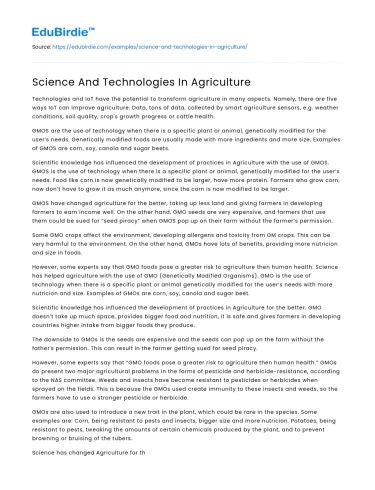Technologies and IoT have the potential to transform agriculture in many aspects. Namely, there are five ways IoT can improve agriculture: Data, tons of data, collected by smart agriculture sensors, e.g. weather conditions, soil quality, crop's growth progress or cattle health.
GMOS are the use of technology when there is a specific plant or animal, genetically modified for the user’s needs. Genetically modified foods are usually made with more ingredients and more size. Examples of GMOS are corn, soy, canola and sugar beets.
Save your time!
We can take care of your essay
- Proper editing and formatting
- Free revision, title page, and bibliography
- Flexible prices and money-back guarantee
Scientific knowledge has influenced the development of practices in Agriculture with the use of GMOS. GMOS is the use of technology when there is a specific plant or animal, genetically modified for the user’s needs. Food like corn is now genetically modified to be larger, have more protein. Farmers who grow corn, now don’t have to grow it as much anymore, since the corn is now modified to be larger.
GMOS have changed agriculture for the better, taking up less land and giving farmers in developing farmers to earn income well. On the other hand, GMO seeds are very expensive, and farmers that use them could be sued for “seed piracy” when GMOS pop up on their farm without the farmer’s permission.
Some GMO crops affect the environment, developing allergens and toxicity from GM crops. This can be very harmful to the environment. On the other hand, GMOs have lots of benefits, providing more nutricion and size in foods.
However, some experts say that GMO foods pose a greater risk to agriculture then human health. Science has helped agriculture with the use of GMO (Genetically Modified Organisms). GMO is the use of technology when there is a specific plant or animal genetically modified for the user’s needs with more nutricion and size. Examples of GMOs are corn, soy, canola and sugar beet.
Scientific knowledge has influenced the development of practices in Agriculture for the better. GMO doesn’t take up much space, provides bigger food and nutrition, it is safe and gives farmers in developing countries higher intake from bigger foods they produce.
The downside to GMOs is the seeds are expensive and the seeds can pop up on the farm without the father's permission. This can result in the farmer getting sued for seed piracy.
However, some experts say that “GMO foods pose a greater risk to agriculture then human health.” GMOs do present two major agricultural problems in the forms of pesticide and herbicide-resistance, according to the NAS committee. Weeds and insects have become resistant to pesticides or herbicides when sprayed on the fields. This is because the GMOs used create immunity to these insects and weeds, so the farmers have to use a stronger pesticide or herbicide.
GMOs are also used to introduce a new trait in the plant, which could be rare in the species. Some examples are: Corn, being resistant to pests and insects, bigger size and more nutricion. Potatoes, being resistant to pests, tweaking the amounts of certain chemicals produced by the plant, and to prevent browning or bruising of the tubers.
Science has changed Agriculture for the better, although there are impacts to human and animal health, it does affect the insects and weeds grown, with them becoming more resistant to pesticides and herbicides. The GMOs provide more nutrition, larger size and overall, just better crops, taking up less space for more GMOs.
Works Cited
- Bonessi, Dominique. “GMO Foods Pose Greater Risk to Agriculture than Human Health, Experts Say.” PBS, Public Broadcasting Service, 17 May 2016, www.pbs.org/newshour/nation/gmo-foods-pose-greater-risk-to-agriculture-than-human-health-experts-say.
- Buiatti, M, et al. “The Application of GMOs in Agriculture and in Food Production for a Better Nutrition: Two Different Scientific Points of View.” Genes & Nutrition, Springer-Verlag, May 2013, ncbi.nlm.nih.gov/pmc/articles/PMC3639326/.
- “Introduction.” Genetically Modified Organisms, sphweb.bumc.bu.edu/otlt/MPH-Modules/PH/GMOs/GMOs_print.html.
- Raman, Ruchir. “The Impact of Genetically Modified (GM) Crops in Modern Agriculture: A Review.” Taylor & Francis, 28 June 2017, www.tandfonline.com/doi/full/10.1080/21645698.2017.1413522.
- “The Science and Technology of Agriculture.” IPTV, 26 Oct. 2018, www.iptv.org/iowapathways/mypath/science-and-technology-agriculture.






 Stuck on your essay?
Stuck on your essay?

